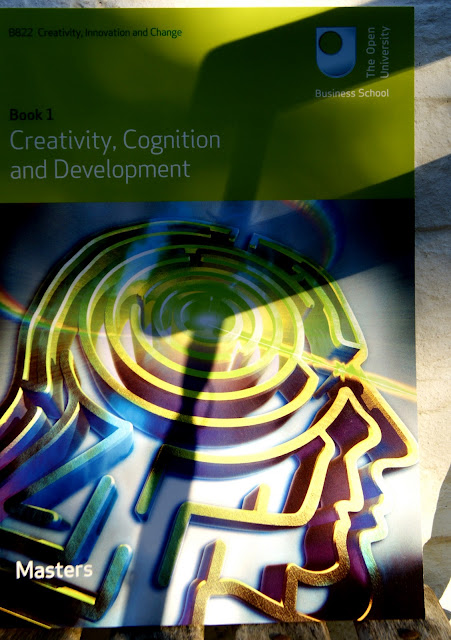CHAPTER 1 CREATIVITY (pp13-30)

What a fool. I always thought of business as boring.
I was a creative, an actor or performer, a writer or director, a visualiser. Yet beyond the antics of the undergraduate each of these can only happen in the context of a business: they have to be financed. Perhaps for too long I toyed unsuccessfully with the idea of being alone in a space with paints or pens (actually a MAC and a Wacom board).
I take notes, pen onto paper, while reading from an iPad. I will get home and find a box of books and will then read from paper and take notes on the iPad. My inclination is to have TWO tablets, one in my left hand to read (a Kindle if it will take the PDFs) the iPad under my right hand so that I can type in notes as I go along.
MY NOTES:
* developments so fast that they are unpredictable.
* expect the unexpected (Handy, 1991)
* increasing competition
* increasing pace of change
* need to add value through continual innovation
* globalisation
* creativity, knowledge & innovation over capital, labour & land
*growth in value of intangible assets
*
I can see that B822 complements H807 'Innovations in E-learning'.
In truth this already is closer to what I perceived H807 would be as there is substantial use of audio and video.
Table 1.0 Innovations with major impact on human history
I want to return to this, add to it and include images.
Plenty will be available under Creative Commons and Google Images.
ACTIVITY 1.1 How would I define creativity?
Innovative problem solving (business, technical, communications, aesthetic) with the outcome a product or artefact that is unique and possibly challenging or controversial.
WHAT ASSOCIATIONS DOES CREATIVITY HAVE FOR YOU?
The arts and media, from TV to film and music, theatre, art, books, ceramics and sculpture to creativity in commerce with advertising and architecture. Even putting up a pedestrian bridge can be a creative endeavour. Or making a sandcastle.
WRITE DOWN WORDS AND PHRASES THAT IT SUGGESTS TO YOU
illustration Design Copywriting Inventiveness Innovative Clever Head turning Memorable Unique Controversial Skilled
ALSO THINK OF:
Problem solving (appropriate) New Novelty is relative Lasting impact
ACTIVITY 2.1
WHAT DO YO THINK CAUSES CREATIVITY, AND WHERE DO NEW IDEAS COME FROM?
In adverting a creative team, a copywriter and art doctor sit together to come up with ideas to sell a product based on a Creative Brief that answers the question 'what is the problem?' in this respect creativity is about solving problems, indeed movie producers and directors define film making as solving problems. Greyson Perry, the ceramicist, argues that 'creativity is mistakes', indeed creativity needs to be a challenge and a risk if the requisite innovation is to occur. For me creativity therefore comes from the desire to overcome a problem, which applies as much to composing a new song, writing copy or a book, designing a new machine, simplifying source code, drawing a sel-portrait, even making a meal with left-overs from the cupboard.
Creativity can be taught and engendered in everyone. The 'genius' is rarely born with a god-given gift, often a parent has pushed them to acquire and practice skills from a very early age. The successful 'creative' may well put in far more hours than Others, even possess a keener, more urgent desire and curiosity.
1950s an ability 1960s mental flexibility 1970s relevant experience 1980s intrinsic motivation 1990s work culture
(Engestrom's ideas of activity systems are worth bringing in here).
ACTIVITY 1.3
Think about two or three people fro the worlds of: Science: Prof. Brian Cox - his ability to communicate the complex in a clear and memorable way. Art: Stephen Appleby - transvestite cartoonist. Caravagio, but perhaps not the Pre-Raphaelites. Jackson Pollock, Salvador Dali and Picaso. Music: Bjork - weird and wonderful, Gary Neuman, David Bowie ... Business: Dyson - from the cyclone vacuum cleaner to the air-blade. Sport: George Best - I don't even follow football but at times his skill looks inventive, playful and in control. Some skiers and skaters. Literature: Haruki Murakami - he has a voice of his own. Henry Miller, Will Self ... And any others: The Saatchis for their advertising in the 1980s; Terry Gilliam and the Monty Python Team. Fashion: Jean-Paul Gaultier - how he dresses, what he design. Architects such as Richard Rogers and Zaha Hadid.
QQ. What do I think is creative about them or what they produce?
It can be outrageous, it works, it solves a problem, it leaves a lasting impression. They may be extrovert, outrageous self-publicists or introvert, even quite 'normal' like James Dyson, Terrance Conran or John Hegarty (Bartle Bogle, Hegarty). They persevere, they are confident or know no better than to be themselves writ large. They learnt their trade from the bottom up and stuck with it.
ACTIVITY 1.4
Think of someone creative people you know, and from work: a friend, relative or child.
What sort of people are they and how do they do thing?
They are observers and can be set apart. They can be egotistical and rubbish at time keeping and the everyday and mundane. They think a lot. They draw upon multiple references. They are highly intelligent. They may be troubled souls in conflict with themselves and the world. They care about their craft skills. Are they performers of sorts seeking cognition as well as reward for what they do? They are the first to do it? They are focused and goal driven.
But the truth, in a business setting might be quite different, with the 'creative' in this setting the good listener and team player?
REFERENCE
Handy, C. (1991) 'The Age of Unreason' in Henry (1991)
Henry, J., Mayles, D., Bell, R., et al (2010) Book 1, Creativity, Cognition and Development.